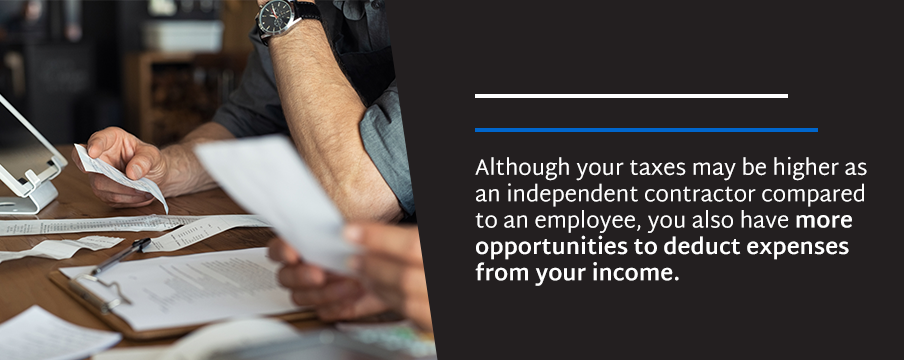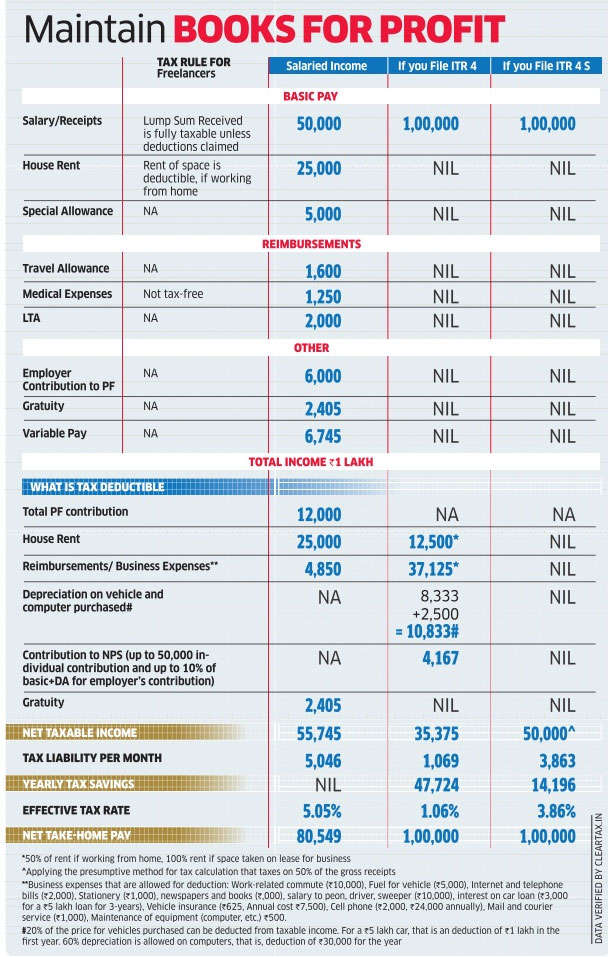
Besides traditional independent retirement accounts (IRAs) and Roth IRAs, independent contractors also can deduct up to $58,000 (for 2021) by setting money aside through a small business retirement plan like a simplified employee pension-IRA (SEP-IRA) or a solo 401(k). Independent contractors can make tax-deductible contributions to retirement plans. The self-employed health insurance deduction reduces your income tax, but not your self-employment tax.

The deduction includes premiums paid for medical insurance, dental insurance, and long-term care insurance. Independent contractors can deduct health insurance premiums they pay for themselves, their spouse, and their dependents. The office space must be regularly and exclusively used for business. The amount of the home office deduction is based on the size of the office space as a percentage of the total square feet of the house. Independent contractors who work from home can deduct part of their rent or mortgage, utilities, and other home-related expenses like repairs or property insurance. A few of the top independent contractor tax deductions are home office expenses, computer and equipment purchases, health insurance, retirement savings, and other expenses related to their trade or business. There are a variety of tax deductions available to independent contractors. Top Tax Deductions for Independent Contractors For example, sales tax if you sell products, excise taxes for the sale of certain items like alcohol and tobacco, and other state and municipality taxes, which will be determined by your geographical location. You may be subject to additional state-level independent contractor taxes. The federal income tax rate starts at 10% and gradually increases to 37% based on a person’s filing status and taxable income after deductions.

Independent contractor tax rates at the federal level vary by income. For example, alcohol, tobacco, firearms, and telephone services are all subject to excise taxes.įederal Income Tax Rates For Independent Contractors Excise tax: In addition to sales tax, certain products and services that you sell may also be subject to excise tax.Sales tax: If you sell products, you’ll need to collect sales tax from customers and remit the sales tax along with the sales tax return to your state.
#TAX DEDUCTION INDEPENDENT CONTRACTOR EXPENSES REGISTRATION#
State and municipal tax: Independent contractors may need to pay income taxes, business taxes, registration fees, or license fees in the cities, counties, or states where they live and work.Other federal taxes include the alternative minimum tax, net investment income tax, and additional Medicare tax. Other federal tax: Independent contractors may need to pay other federal taxes depending on their particular financial situation.The tax rate is 15.3% on net earnings from self-employment up to $142,800 for the year 2021 and 2.9% on net earnings above that threshold. Self-employment tax: This federal tax is how independent contractors pay into Social Security and Medicare and is calculated on Form 1040, Schedule SE.The tax rate varies from 10% to 37%, based on the level of income. Independent contractor taxes at the federal level are based on total income for the year, minus any tax deductions or tax credits. Federal income tax: This tax is reported on the Form 1040 federal tax return.Taxes that independent contractors need to pay include:

Some cities or counties charge business taxes, registration fees, or licenses. Independent contractors also pay income tax in the state or states where they live and work. At the federal level, independent contractors pay federal income tax and self-employment tax on their net earnings. Independent contractors pay federal, state, and local taxes. List of Taxes for Independent Contractors If your annual earnings are reported to you on Form W-2, then you are an employee, and this article doesn’t apply to you. If they report your annual earnings to you on Form 1099-NEC, then you have been classified as an independent contractor and must pay taxes as outlined in this article.

The business or businesses for which you work should classify you as an employee or independent contractor before you begin work. The IRS provides a lot of information to help you make the decision. Tip: Determining the proper classification between employee and independent contractor is difficult with lots of grey areas.


 0 kommentar(er)
0 kommentar(er)
